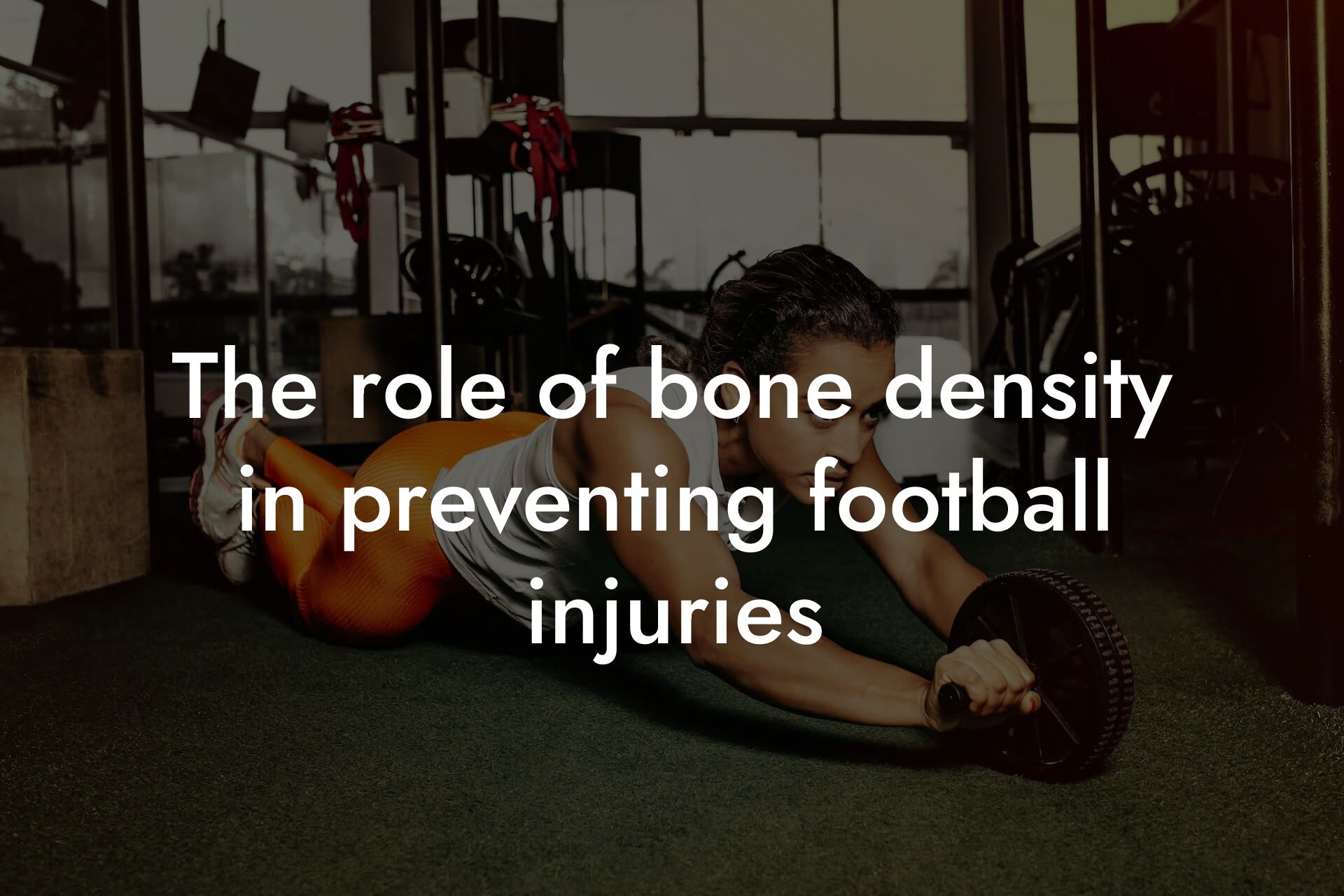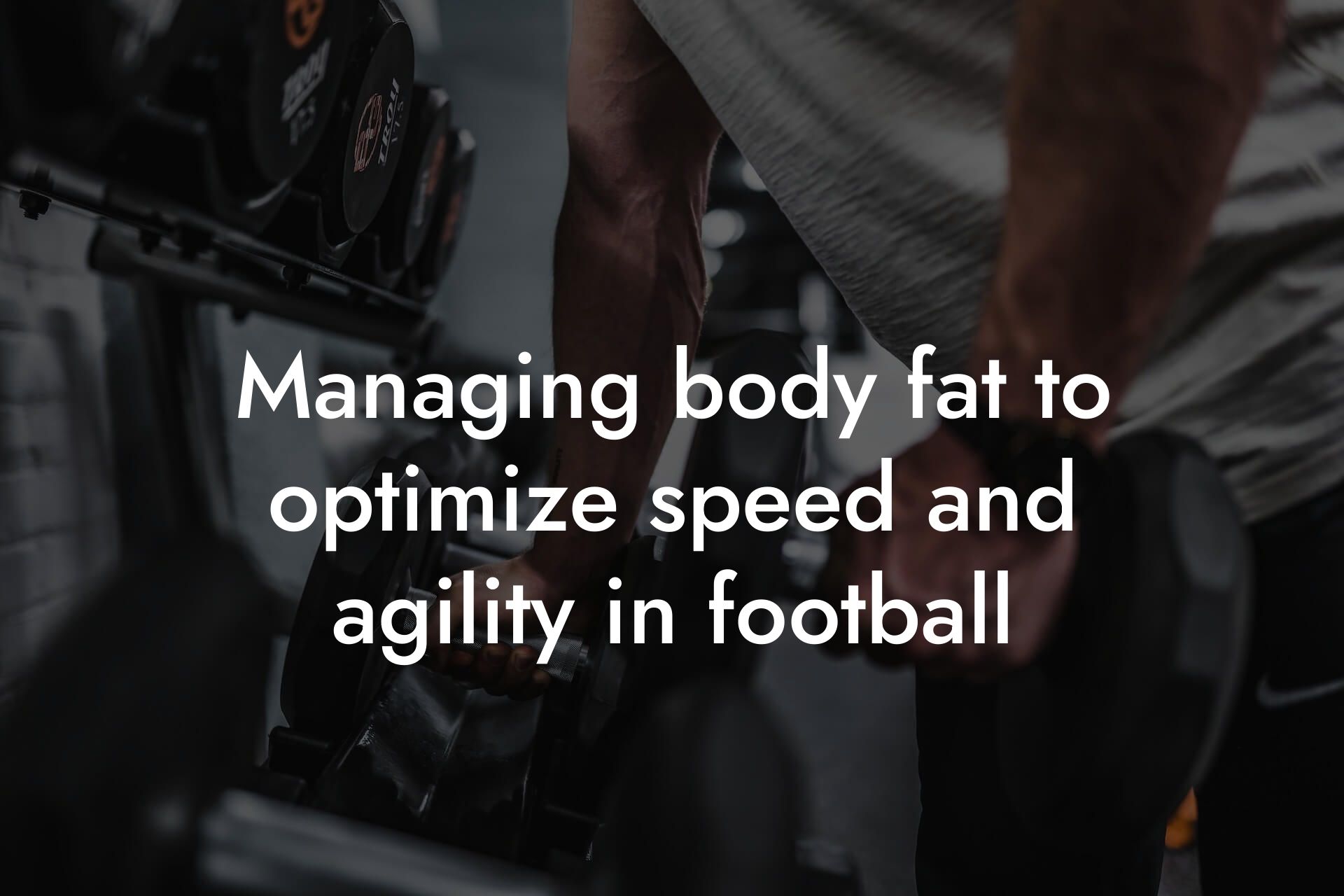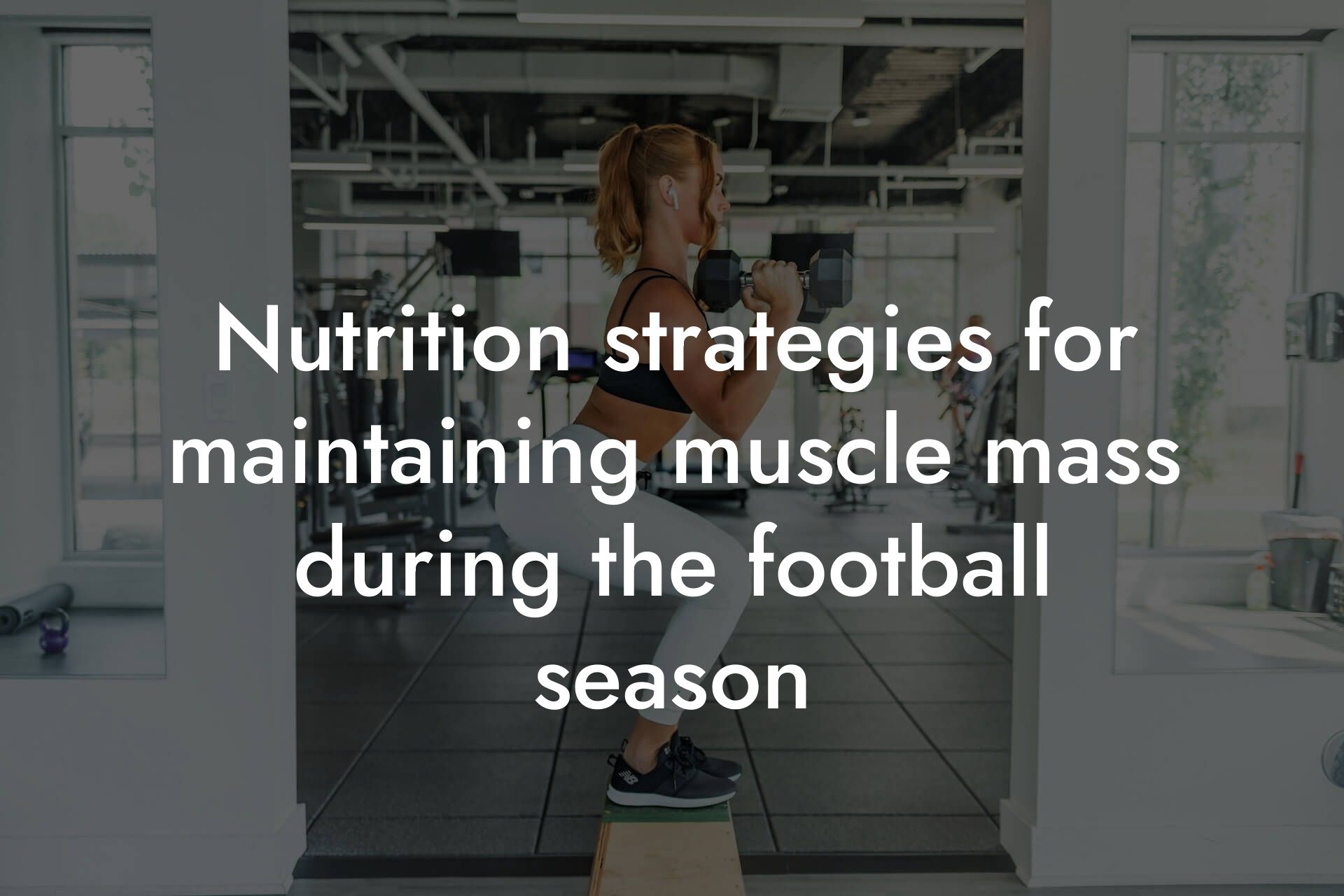As a football athlete, you understand the importance of having a strong, powerful physique to dominate on the field. However, achieving the perfect balance between mass and speed is a delicate art that requires careful consideration. In this article, we'll delve into the intricacies of balancing mass and speed, providing you with a comprehensive guide to optimize your performance and take your game to the next level.
Table of Contents
Understanding the Importance of Mass and Speed
Mass and speed are two critical components of a football player's physiology. Mass refers to the amount of muscle mass you have, which directly impacts your strength, power, and endurance. On the other hand, speed is the rate at which you can move your body, which affects your agility, acceleration, and overall performance. Having too much mass without sufficient speed can make you slow and sluggish, while having too much speed without adequate mass can leave you lacking in power and strength.
The Ideal Balance for Football Athletes
So, what's the ideal balance between mass and speed for football athletes? The answer lies in finding a sweet spot that allows you to maintain a high level of strength, power, and endurance while still being agile and quick. Generally, football players should aim to have a body fat percentage between 10-15% and a lean body mass index (LBMI) of 20-25. This will provide the necessary strength, power, and endurance to excel on the field while still allowing for adequate speed and agility.
Factors Affecting Mass and Speed
Several factors can impact your mass and speed, including genetics, nutrition, training, and recovery. Genetics play a significant role in determining your body type and athletic potential, while nutrition provides the necessary fuel for muscle growth and repair. A well-structured training program can help you build strength, power, and endurance, while adequate recovery is essential for muscle repair and growth. Additionally, factors such as sleep, stress, and overall lifestyle can also impact your mass and speed.
Training Strategies for Balancing Mass and Speed
When it comes to training, there are several strategies you can employ to balance mass and speed. One effective approach is to incorporate a combination of strength training, power training, and speed training into your program. Strength training helps build muscle mass, power training improves your ability to generate force quickly, and speed training enhances your acceleration and agility. Additionally, incorporating plyometric exercises, agility drills, and resistance band training can help improve your speed and power.
Nutrition and Supplementation for Mass and Speed
Nutrition plays a critical role in supporting muscle growth and repair. To balance mass and speed, focus on consuming a diet rich in protein, complex carbohydrates, and healthy fats. Aim to consume 1.6-2.2 grams of protein per kilogram of body weight, 2-3 grams of complex carbohydrates per kilogram of body weight, and 0.5-1 gram of healthy fats per kilogram of body weight. Additionally, consider incorporating supplements such as creatine, protein powder, and branched-chain amino acids (BCAAs) to support muscle growth and recovery.
Body Composition Analysis for Football Athletes
Understanding your body composition is crucial for balancing mass and speed. At Tano Performance Group, we use advanced DEXA technology to provide football athletes with a comprehensive body assessment. Our DEXA scan provides detailed information on body fat percentage, lean body mass, bone density, and muscle mass distribution, allowing you to tailor your training and nutrition program to your specific needs.
Balancing mass and speed is a delicate art that requires careful consideration and attention to detail. By understanding the importance of mass and speed, finding the ideal balance, and incorporating effective training and nutrition strategies, you can optimize your performance and take your game to the next level. Remember, a comprehensive body assessment using DEXA technology can provide valuable insights into your body composition, helping you make informed decisions about your training and nutrition program. With the right approach, you can achieve the perfect balance between mass and speed, dominating on the field and achieving your goals.
Frequently Asked Questions
What is the importance of balancing mass and speed in football?
Balancing mass and speed is crucial for football athletes as it directly impacts their performance on the field. Having the right amount of mass provides power and strength, while speed allows for quick movements and agility. When an athlete achieves a balance between the two, they can excel in their position and gain a competitive edge.
How does excess body fat affect a football player's speed?
Excess body fat can significantly slow down a football player's speed. Carrying extra weight increases the energy required to move, making it more difficult to accelerate and decelerate quickly. This can lead to reduced agility, slower reaction times, and decreased overall performance.
What is the ideal body fat percentage for a football player?
The ideal body fat percentage for a football player varies depending on their position. Generally, defensive backs and wide receivers aim for 6-8% body fat, while linemen and linebackers aim for 10-12% body fat. However, the most important factor is achieving a lean, athletic physique that supports optimal performance.
How can I increase my muscle mass as a football player?
To increase muscle mass, focus on a balanced diet that includes adequate protein, complex carbohydrates, and healthy fats. Aim to consume 1-1.5 grams of protein per kilogram of body weight daily. Additionally, incorporate strength training exercises that target multiple muscle groups at once, such as squats, deadlifts, and bench press.
What is the role of strength training in improving speed?
Strength training plays a critical role in improving speed by increasing an athlete's power output. When an athlete develops strength in their legs, hips, and core, they can generate more force and speed. Focus on exercises that improve explosive power, such as box jumps, depth jumps, and resisted sprints.
How can I improve my acceleration and deceleration?
Improving acceleration and deceleration requires a combination of strength, power, and technique. Focus on exercises that target your legs, hips, and core, such as squats, lunges, and deadlifts. Additionally, incorporate plyometric exercises like box jumps and depth jumps to improve explosive power.
What is the importance of flexibility and mobility in football?
Flexibility and mobility are essential for football players as they allow for efficient movement patterns and reduce the risk of injury. Incorporate stretching and mobility exercises into your training routine, focusing on areas like the hips, legs, and ankles.
How can I maintain my speed and agility during the off-season?
Maintaining speed and agility during the off-season requires consistent training and attention to nutrition. Focus on exercises that improve power and explosiveness, such as plyometrics and resistance band training. Additionally, incorporate agility drills like cone drills and ladder drills to maintain quickness and change of direction.
What is the role of nutrition in balancing mass and speed?
Nutrition plays a critical role in balancing mass and speed. A well-balanced diet that includes adequate protein, complex carbohydrates, and healthy fats provides the necessary fuel for optimal performance. Additionally, proper hydration and electrolyte balance are essential for maintaining speed and agility.
How can I determine my ideal body composition for football?
Determining your ideal body composition for football involves assessing your body fat percentage, muscle mass, and bone density. Consult with a qualified coach or sports dietitian to develop a personalized plan that suits your position and performance goals.
What is the importance of bone density for football players?
Bone density is critical for football players as it reduces the risk of injury and improves overall performance. Adequate calcium and vitamin D intake, along with regular strength training, can help maintain optimal bone density.
How can I improve my power output as a football player?
Improving power output requires a combination of strength, speed, and technique. Focus on exercises that target multiple muscle groups at once, such as squats, deadlifts, and bench press. Additionally, incorporate plyometric exercises like box jumps and depth jumps to improve explosive power.
What is the role of plyometrics in improving speed and agility?
Plyometrics play a critical role in improving speed and agility by increasing an athlete's power output and reactivity. Incorporate exercises like box jumps, depth jumps, and resisted sprints into your training routine to improve explosive power and quickness.
How can I reduce my body fat percentage as a football player?
Reducing body fat percentage requires a combination of proper nutrition, consistent training, and adequate rest. Focus on a balanced diet that includes lean protein sources, complex carbohydrates, and healthy fats. Additionally, incorporate high-intensity interval training (HIIT) and strength training exercises to burn fat and build lean muscle mass.
What is the importance of recovery and rest for football players?
Recovery and rest are critical for football players as they allow for muscle repair, rebuilding, and adaptation. Adequate rest and recovery can improve performance, reduce the risk of injury, and enhance overall well-being.
How can I maintain my muscle mass during the off-season?
Maintaining muscle mass during the off-season requires consistent training and attention to nutrition. Focus on exercises that target multiple muscle groups at once, and consume adequate protein to support muscle growth and repair.
What is the role of agility drills in improving speed and quickness?
Agility drills play a critical role in improving speed and quickness by enhancing an athlete's ability to change direction quickly and efficiently. Incorporate drills like cone drills, ladder drills, and shuttle runs into your training routine to improve agility and reaction time.
How can I improve my acceleration and deceleration on the field?
Improving acceleration and deceleration on the field requires a combination of strength, power, and technique. Focus on exercises that target your legs, hips, and core, and incorporate agility drills like cone drills and ladder drills to improve quickness and change of direction.
What is the importance of proper hydration for football players?
Proper hydration is critical for football players as it affects performance, recovery, and overall health. Aim to consume at least 8-10 glasses of water per day, and make sure to hydrate before, during, and after training and competition.
How can I incorporate resistance band training into my workout routine?
Incorporating resistance band training into your workout routine can improve strength, power, and speed. Use bands to perform exercises like banded squats, lunges, and deadlifts, and incorporate them into your agility drills and plyometric exercises.
What is the role of functional training in improving football performance?
Functional training plays a critical role in improving football performance by enhancing an athlete's ability to perform movements that mimic game-like situations. Incorporate exercises that target multiple muscle groups at once, and focus on movements that improve power, speed, and agility.
How can I improve my overall athleticism as a football player?
Improving overall athleticism requires a well-rounded training program that includes strength training, plyometrics, agility drills, and functional training. Focus on exercises that target multiple muscle groups at once, and incorporate movements that improve power, speed, and agility.
What is the importance of sports-specific training for football players?
Sports-specific training is critical for football players as it allows them to develop the skills and movements required for their position. Incorporate training that mimics game-like situations, and focus on exercises that improve power, speed, and agility.
How can I balance my training and nutrition to achieve optimal performance?
Balancing training and nutrition requires a well-planned approach that takes into account your position, performance goals, and nutritional needs. Consult with a qualified coach or sports dietitian to develop a personalized plan that suits your needs.
Here are some related articles you might love...
- The role of bone density in preventing football injuries
- Managing body fat to optimize speed and agility in football
- Nutrition strategies for maintaining muscle mass during the football season
- Recovery strategies for football athletes: Nutrition and rest
- How DEXA scans can benefit professional football players
- How to maintain peak performance during the football season
- The importance of body composition in football performance
- Strength training tips for football players
- Off-season fitness programs for football players
Zak Faulkner
Zak Faulkner is a leading authority in the realm of physical health and body composition analysis, with over 15 years of experience helping professionals optimise their fitness and well-being. As one the experts behind Tano Performance Group, Zak has dedicated his career to providing in-depth, science-backed insights that empower clients to elevate their physical performance and overall health.
With extensive knowledge of DEXA technology, Zak specializes in delivering comprehensive body assessments that offer precise data on body fat, muscle mass, bone density, and overall physique. His expertise enables individuals to make informed decisions and achieve their fitness goals with accuracy and confidence. Zak’s approach is rooted in a deep understanding of human physiology, combined with a passion for helping clients unlock their full potential through personalised strategies.
Over the years, Zak has earned a reputation for his commitment to excellence, precision, and client-focused service. His guidance is trusted by top professionals who demand the best when it comes to their health. Whether advising on fitness programs, nutritional strategies, or long-term wellness plans, Zak Faulkner’s insights are a valuable resource for anyone serious about taking their health and fitness to the next level.
At Tano Performance Group, Zak continues to lead our Content Team revolutionising how professionals approach their physical health, offering unparalleled expertise that drives real results.




